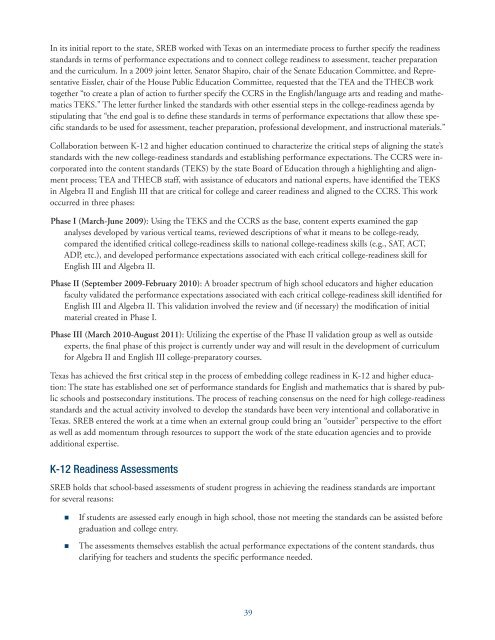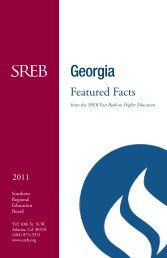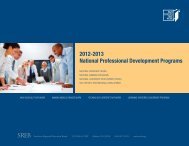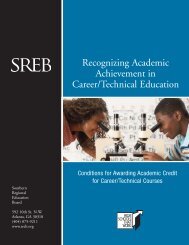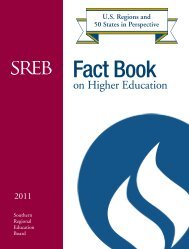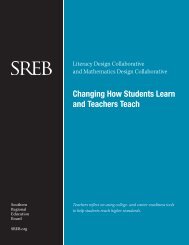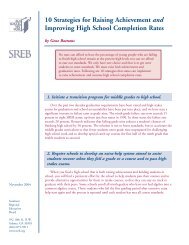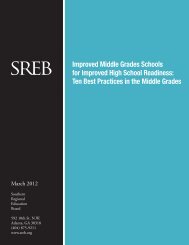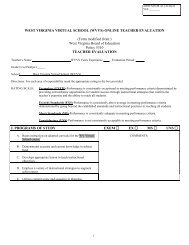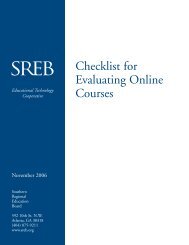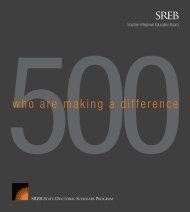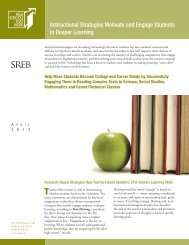Final Progress Reports - Southern Regional Education Board
Final Progress Reports - Southern Regional Education Board
Final Progress Reports - Southern Regional Education Board
Create successful ePaper yourself
Turn your PDF publications into a flip-book with our unique Google optimized e-Paper software.
In its initial report to the state, SREB worked with Texas on an intermediate process to further specify the readiness<br />
standards in terms of performance expectations and to connect college readiness to assessment, teacher preparation<br />
and the curriculum. In a 2009 joint letter, Senator Shapiro, chair of the Senate <strong>Education</strong> Committee, and Representative<br />
Eissler, chair of the House Public <strong>Education</strong> Committee, requested that the TEA and the THECB work<br />
together “to create a plan of action to further specify the CCRS in the English/language arts and reading and mathematics<br />
TEKS.” The letter further linked the standards with other essential steps in the college-readiness agenda by<br />
stipulating that “the end goal is to define these standards in terms of performance expectations that allow these specific<br />
standards to be used for assessment, teacher preparation, professional development, and instructional materials.”<br />
Collaboration between K-12 and higher education continued to characterize the critical steps of aligning the state’s<br />
standards with the new college-readiness standards and establishing performance expectations. The CCRS were incorporated<br />
into the content standards (TEKS) by the state <strong>Board</strong> of <strong>Education</strong> through a highlighting and alignment<br />
process; TEA and THECB staff, with assistance of educators and national experts, have identified the TEKS<br />
in Algebra II and English III that are critical for college and career readiness and aligned to the CCRS. This work<br />
occurred in three phases:<br />
Phase I (March-June 2009): Using the TEKS and the CCRS as the base, content experts examined the gap<br />
analyses developed by various vertical teams, reviewed descriptions of what it means to be college-ready,<br />
compared the identified critical college-readiness skills to national college-readiness skills (e.g., SAT, ACT,<br />
ADP, etc.), and developed performance expectations associated with each critical college-readiness skill for<br />
English III and Algebra II.<br />
Phase II (September 2009-February 2010): A broader spectrum of high school educators and higher education<br />
faculty validated the performance expectations associated with each critical college-readiness skill identified for<br />
English III and Algebra II. This validation involved the review and (if necessary) the modification of initial<br />
material created in Phase I.<br />
Phase III (March 2010-August 2011): Utilizing the expertise of the Phase II validation group as well as outside<br />
experts, the final phase of this project is currently under way and will result in the development of curriculum<br />
for Algebra II and English III college-preparatory courses.<br />
Texas has achieved the first critical step in the process of embedding college readiness in K-12 and higher education:<br />
The state has established one set of performance standards for English and mathematics that is shared by public<br />
schools and postsecondary institutions. The process of reaching consensus on the need for high college-readiness<br />
standards and the actual activity involved to develop the standards have been very intentional and collaborative in<br />
Texas. SREB entered the work at a time when an external group could bring an “outsider” perspective to the effort<br />
as well as add momentum through resources to support the work of the state education agencies and to provide<br />
additional expertise.<br />
K-12 Readiness Assessments<br />
SREB holds that school-based assessments of student progress in achieving the readiness standards are important<br />
for several reasons:<br />
If students are assessed early enough in high school, those not meeting the standards can be assisted before<br />
graduation and college entry.<br />
The assessments themselves establish the actual performance expectations of the content standards, thus<br />
clarifying for teachers and students the specific performance needed.<br />
39


